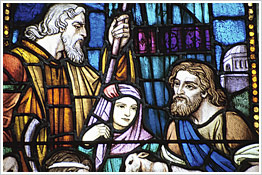Gifts of the Magi
By Marjorie Foerster Eddington
Question
What is the significance of the magi's gifts to Jesus?
Answer
 It's become a Christian tradition to look at the gifts symbolically. Bible scholar William Barclay explains (37-38): It's become a Christian tradition to look at the gifts symbolically. Bible scholar William Barclay explains (37-38):
- "Gold is the gift for a king." He also notes that Seneca affirms that if you're visiting a king, you had to take gifts.
- "Frankincense is the gift for a priest." It was commonly used in the Temple for worship and sacrifices.
- "Myrrh is the gift for one who is to die." People used myrrh for embalming purposes.
As a result, the belief has been that the magi, either consciously or subconsciously, were identifying Jesus' nature and role through their gifts – as a (1) king who would (2) lead people to God and (3) die for all of us.
But more recent scholars say that Matthew's purpose was not to point out such symbolism since there's nothing in Matthew that indicates this. Nevertheless, "all three were valuable, and together they formed a munificent gift, suitable for offering to a king" (Morris 41).
Gold, of course, is a very precious metal. Frankincense and myrrh are both "expensive aromatic gum resins, not native to Palestine, with a variety of religious and medical connotations" (Boring 143).
In addition, given that Jesus and his family had to flee to Egypt to avoid Herod's persecution of boys in Bethlehem around Jesus' age (2 years and under), these gifts were great enough to take care of Jesus and his family and supply their needs.
Perhaps the most significant points about the gifts are not what they are, but from whom they came. They came from the magi:
- The magi were Gentiles (not Jews), who perhaps came from Babylon. We don't know how many there were; no number is mentioned.
- The men were astronomers or astrologers, people who studied the stars.
- They discovered the magnificent star (or constellation or whatever it may have been) that said to them there was a king born.
- Instead of just thinking that the star was really amazing, they decided to leave their own country and find this king by following the star.
- They did not go empty-handed. They brought gifts.
- They actively searched for him, going to Herod and then to Bethlehem.
- When they saw they had arrived at their destination, they were "overwhelmed with joy" (Matt 2:10 NRSV).
- They worshipped Jesus, who was probably around two, and gave him incredible gifts – gifts worthy of a king.
- They listened to the angel message not to go back to Herod but to go home another way.
It's pretty awesome when you think of who the magi, the "wise men," were. Perhaps they were "wise" because they recognized the Christ and did everything they could to acknowledge and honor him. May we do the same!
Works Cited
Barclay, William. The Gospel of Matthew, Vol 1 of The New Daily Study Bible. Louisville: Westminster John Knox P, 2001.
Boring, M. Eugene. The Gospel of Matthew. Vol 8 of The New interpreter's Bible. Gen. ed. Leander E. Keck et al. Nashville: Abingdon P, 1995. 12 vols.
Morris, Leon. The Gospel According to Matthew. Grand Rapids: Eerdmans, 1992. |

